Cast a Dark Shadow is a 1955 British suspense film noir directed by Lewis Gilbert and written by John Cresswell, based on the 1952 play Murder Mistaken by Janet Green. It stars Dirk Bogarde, Margaret Lockwood, Kay Walsh, Kathleen Harrison and Robert Flemyng. The film released on 20 September 1955, distributed by Eros Films Ltd. in the United Kingdom and Distributors Corporation of America in the United States. The story concerns a husband who murders his wife.
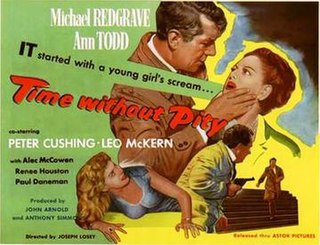
Time Without Pity is a 1957 British film noir thriller film directed by Joseph Losey and starring Michael Redgrave, Ann Todd, Leo McKern, Paul Daneman, Peter Cushing, Alec McCowen and Renee Houston. It is about a father trying to save his son from execution for murder.
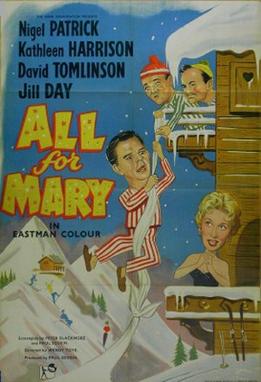
All for Mary is a 1955 British comedy film brought to the screen by Paul Soskin Productions for the Rank Organisation. It was based on a successful West End play by the English husband and wife team of Kay Bannerman and Harold Brooke. It was directed by Wendy Toye, produced by Paul Soskin with the screenplay by Paul Soskin and Peter Blackmore. It starred Nigel Patrick, David Tomlinson, Jill Day and Kathleen Harrison. Eastmancolor Cinematography was by Reginald H. Wyer. The film had an original copyright notice with a renewal in 1983.

Vote for Huggett is a 1949 British comedy film directed by Ken Annakin and starring Jack Warner, Kathleen Harrison, Susan Shaw and Petula Clark. Warner reprises his role as the head of a London family, in the post-war years.

The Huggetts Abroad is a 1949 British comedy drama film directed by Ken Annakin and starring Jack Warner, Kathleen Harrison, Petula Clark and Susan Shaw. It was the fourth and final film in The Huggetts series.

Once a Sinner is a 1950 British drama film directed by Lewis Gilbert and starring Pat Kirkwood, Jack Watling and Joy Shelton.

Tom Brown's Schooldays is a 1951 British drama film, directed by Gordon Parry, produced by Brian Desmond Hurst, and starring John Howard Davies, Robert Newton and James Hayter. It is based on the 1857 novel of the same name by Thomas Hughes.

Home and Away is a 1956 British drama film directed by Vernon Sewell and starring Jack Warner and Kathleen Harrison. It depicts the life of an ordinary working-class man after he wins the football pools. The film reunited Warner and Harrison who had previously appeared together in the Huggetts series of films.

Sally in Our Alley is a 1931 British romantic comedy drama film directed by Maurice Elvey and starring Gracie Fields, Ian Hunter, and Florence Desmond. It is based on the 1923 West End play The Likes of Her by Charles McEvoy.
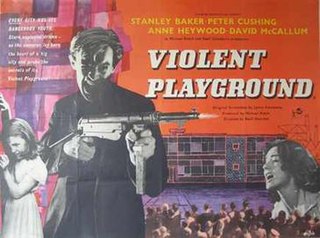
Violent Playground is a black and white 1958 British film directed by Basil Dearden and starring Stanley Baker, Peter Cushing, and David McCallum. The film, which deals with the genre of juvenile delinquent, has an explicit social agenda. It owes much to U.S. films of a similar genre.

The Terror is a 1938 British crime film directed by Richard Bird and starring Wilfrid Lawson, Linden Travers and Bernard Lee. It was based on the 1927 play The Terror by Edgar Wallace. The play had previously been adapted as the American film The Terror(1928).
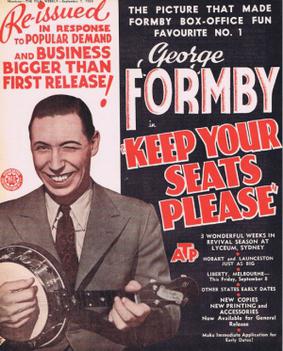
Keep Your Seats, Please is a 1936 British comedy film directed by Monty Banks and starring George Formby, Florence Desmond and Alastair Sim. It marked the film debut of the child star Binkie Stuart. The film was made by Associated Talking Pictures.

Piccadilly Incident is a 1946 British drama film directed by Herbert Wilcox and starring Anna Neagle, Michael Wilding, Coral Browne, Edward Rigby and Leslie Dwyer.
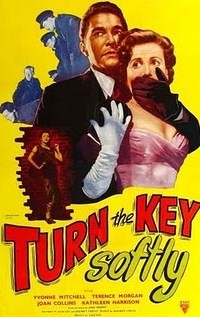
Turn the Key Softly is a 1953 British drama film directed by Jack Lee and starring Yvonne Mitchell, Joan Collins, Kathleen Harrison, and Terence Morgan. Lee and producer Maurice Cowan also wrote the screenplay, based on the 1951 novel of the same title by John Brophy, dealing with the first 24 hours of freedom for three women released on probation from prison on the same morning. It was shot at Pinewood Studios and on location around London. The film's sets were designed by the art director Donald M. Ashton. It was released by Rank's General Film Distributors.

The Wedding of Lilli Marlene is a 1953 British drama film directed by Arthur Crabtree and starring Lisa Daniely, Hugh McDermott and Sid James. It was a sequel to the 1950 film Lilli Marlene, also directed by Crabtree.
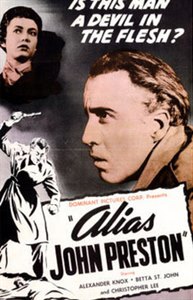
Alias John Preston is a 1955 British 'B' thriller film directed by David MacDonald and starring Christopher Lee, Betta St. John and Alexander Knox. A mysterious and wealthy man moves to a small village where he outwardly appears to be a friendly figure but nurses a dangerous secret.

Hi Gang! is a 1941 British comedy film directed by Marcel Varnel and starring Bebe Daniels, Ben Lyon and Vic Oliver. It was a spin-off from the popular BBC radio series Hi Gang!.

Child in the House is a 1956 British drama film directed by Cy Endfield and starring Phyllis Calvert, Eric Portman and Stanley Baker. It is based on the novel A Child in the House by Janet McNeill. A girl struggles to cope with her uncaring relatives.
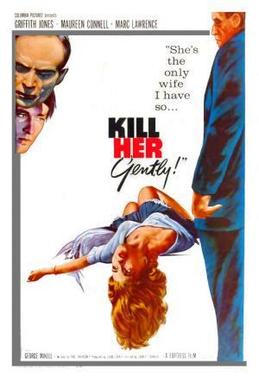
Kill Her Gently is a 1957 British second feature thriller film directed by Charles Saunders and starring Griffith Jones, Maureen Connell and Marc Lawrence.

Waterfront is a 1934 crime drama novel by the British writer John Brophy. It is set in his native Liverpool amongst the world of dockworkers.



















